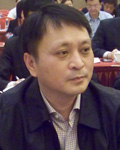|
Safety first
The World Health Organization released on February 28 a comprehensive assessment by international experts on the health risks associated with the Fukushima nuclear accident, which says the estimated risk for specific cancers in certain subsets of the population in Fukushima Prefecture has increased. In females exposed as infants, the estimated risks of thyroid cancer increased up to 70 percent and the risks of breast cancer increased up to 6 percent; in males exposed as infants, the risk of leukemia rose by around 7 percent.
"We should have a correct understanding of nuclear power; it is wrong to abandon it just because of the Fukushima accident," said Huang, adding that safety should be the top priority in developing nuclear power.
After the Fukushima nuclear accident, the International Atomic Energy Agency, world leaders and nuclear experts from various countries have all reassessed nuclear safety in terms of both management and technology.
As for technologies, Zhu says all the completed and to-be-constructed nuclear power plants in China are using third-generation AP1000 technology, while the Fukushima nuclear power station used outdated technology from the first and second generations. The accident occurred because the two emergency power supply systems were destroyed and water cooling failed to work.
 |
|
Zheng Yanguo | Zheng Yanguo, General Manager of CNNC Hunan Taohuajiang Nuclear Power Co. Ltd., says the third-generation AP1000 technology is quite safe. In case of malfunction, the technology can ensure the safety of a nuclear power station within 72 hours without manned operation. This is the technology the Taohuajiang nuclear power station will adopt.
According to Zhu, modern technology has been able to reduce the probability of a nuclear accident to a minimum. Immediately after any accident, a complete set of measures can effectively reduce the radiation to the minimum. Currently, the fourth generation of nuclear power station facilities is safer and more economical. Even the amount of water used to cool facilities may be significantly reduced.
"China has been using the safest types of reactors to develop nuclear power, which are the most advanced technologies available now," said Zhu. "We started later in developing nuclear power, therefore we can learn from the experience of foreign countries."
As for nuclear power administration and supervision, Zhu thinks China has been stressing nuclear safety and adopted strict measures in planning, designing and construction to ensure safety. Zheng also says after the Fukushima accident, China had made comprehensive safety inspections on all the nuclear power plants a requirement.
China has also formulated some regulations and provisions on the prevention and control of nuclear pollution. Zhu suggests the government go further and formulate a law on the supervision of nuclear safety, incorporating various policies and technologies related to nuclear safety while ensuring the sound development of the industry.
Prospects
"After the Fukushima accident, the Chinese people become more afraid of nuclear energy, but at the same time, they also know more about nuclear radiation and understand the circumstances under which it is safe to use radiation," Zhu said. People are afraid of the invisibility of nuclear radiation. "In fact, living on Earth, we are exposed to radiation every day, but within a certain dose we are safe," he said.
"Nuclear power, as a kind of clean energy, must be developed in China. We should make common people better understand related knowledge," said Huang.
Putting aside people's fear, Zhu thinks China will have a bright future in developing nuclear power, and there is a large room for improvement in nuclear technologies. The Shandong Shidaowan Nuclear Power Station under construction adopts the fourth generation of nuclear power technology independently developed by China. Tsinghua University and the China Institute of Atomic Energy are also developing fourth-generation nuclear reactors.
Nuclear power is more competitive than thermal power in prices. "To governments and enterprises, to invest in nuclear power is worthwhile. This is why so many local governments and enterprises are willing to build nuclear power plants," Zhu said.
In response to the possibility of restarting nuclear power plants in inland areas, Zhu and Huang both mentioned that in the United States and Europe, many nuclear power plants are built in inland areas.
"For safety, the government needs to carry out more evaluations on building inland nuclear power plants, but it has not ruled out completely the building of nuclear power plants in inland areas," Zhu said.
According to Zheng, the preparatory work has been completed for the Taohuajiang nuclear power project, whose planned installed capacity is 5 million kilowatts. Once in operation, power shortages in Hunan will be significantly reduced.
"The Taohuajiang Nuclear Power Station is fully ready to begin construction," said Zheng. "What we need is the State Council's approval. If construction can begin this year, the station can be put into production by 2017 or 2018."
Email us at: yushujun@bjreview.com | 